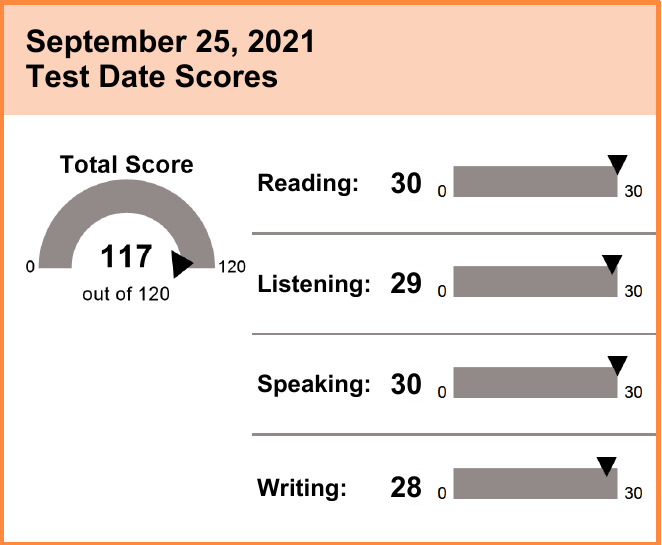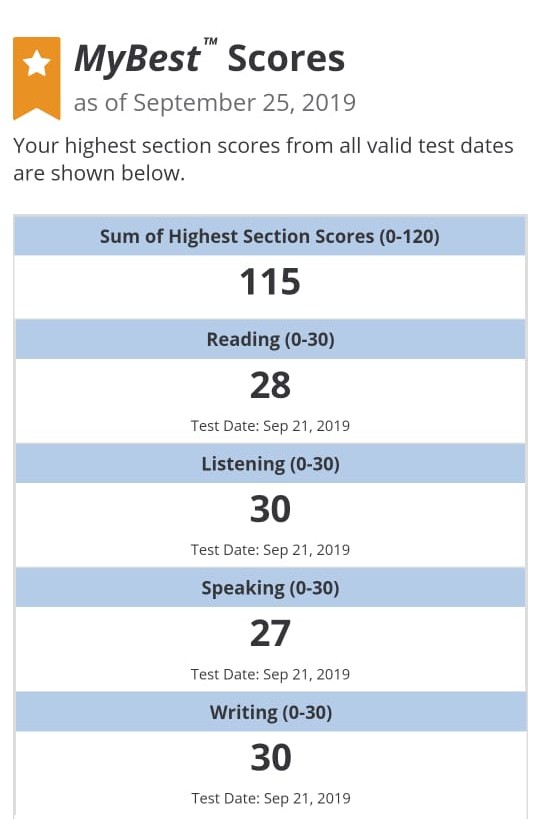One week for the TOEFL. Is it enough?
Official scores
2021 - Second attempt because the first score had expired

2019 - First attempt

My experience
As you can see above, I have written the TOEFL exam twice. Unfortunately, my first score had expired by the time I had decided to apply for my Masters. I scored a 30/30 in all sections albeit interleaved among both the tests. Hence, I believe that I know what it takes to score a perfect score in each section.
While the TOEFL is much easier than the Verbal section of the GRE, it is essential that one familiarizes themselves with some of its nuances. In particular, managing the timing of the Speaking section is crucial.
There are a plethora of detailed guides available online on how to study for the TOEFL. I would recommend that you check out some posts on Reddit. There is no one-size-fits-all strategy. Hence, I recommended reading a few different experiences.
The goals of this exercise is given below:
- Gather the required test prep resources.
- Analyze the common mistakes that test-takers make.
As for this blog post, I will address each of the above points based on my experience. Before that, let’s start with a precursor.
Part 0: Before you start
- Create an ETS TOEFL account. I had issues with re-using the same username as the ETS GRE account. A weird one. But not sure if that has been resolved now.
- Familiarize yourself with the test pattern, i.e, the test duration, the number of sections and the number of questions in each section. TOEFL has a new pattern with a reduced duration. Ensure that this is the version that you look at.
Part 1: Resources
- Official TOEFL guide. Covers every topic. A bonus - it has practice tests as well.
- For the Speaking section, Notefull's YouTube playlist on Speaking is perfect.
- Random TOEFL Listening practice tests on Youtube. An Notefull's YouTube playlistexample
Part 2: Common Mistakes
-
Reading
Reading the entire passage before answering the questions.
Unlike the GRE, the TOEFL reading passages are much longer. However, the question types vary. The initial ones are usually detail-oriented. As you progress through the questions, you will understand the big ideas. Only the last question focuses on the big ideas. So I would recommend that you attempt the questions in order. -
Listening
Taking too many notes. -
Speaking
Not practicing your timing. -
Writing
Too short.
Not fully pertinent.
Part 3: Test Day
You are required to carry identification proof. In India, it is a valid passport. Refer to the ETS website for the requirements for your country.
Please ensure that it has the correct first name. Until I applied for the GRE - I wasn’t aware that my first name was ‘Somansh Reddy’ and not just ‘Somansh’.
Also, ensure that your passport has NOT expired. It must be valid on the day of the exam. Although this seems obvious, this might go unnoticed by the test taker in the hullabaloo of test preparation. But it does not escape the scrutiny of the officials at the test center.
Part 4: My takeaways
-
Reading
The reading questions in TOEFL are easier than the corresponding ones in the GRE. However, it may some questions may still be tricky. The official guide explains every question type so I would recommend that you are at least familiar with these. This book also has multiple reading sections which would suffice. No extra resources are required. -
Listening
Practice the listening section from the official guide if you access to the recordings. Whether you have this or not, definitely take a look at listening practice sections from YouTube. The goal of the listening section is not to take notes. Your notes are just a supplement. I found that I did not use my notes for 95% of the questions. -
Speaking
Practice. Practice. Practice. Focus on the timing. It is the most crucial element of the Speaking section. Once you get a hang of the timing, focus on the content. Finally, the intonation. -
Writing
Too short
Not fully pertinent.